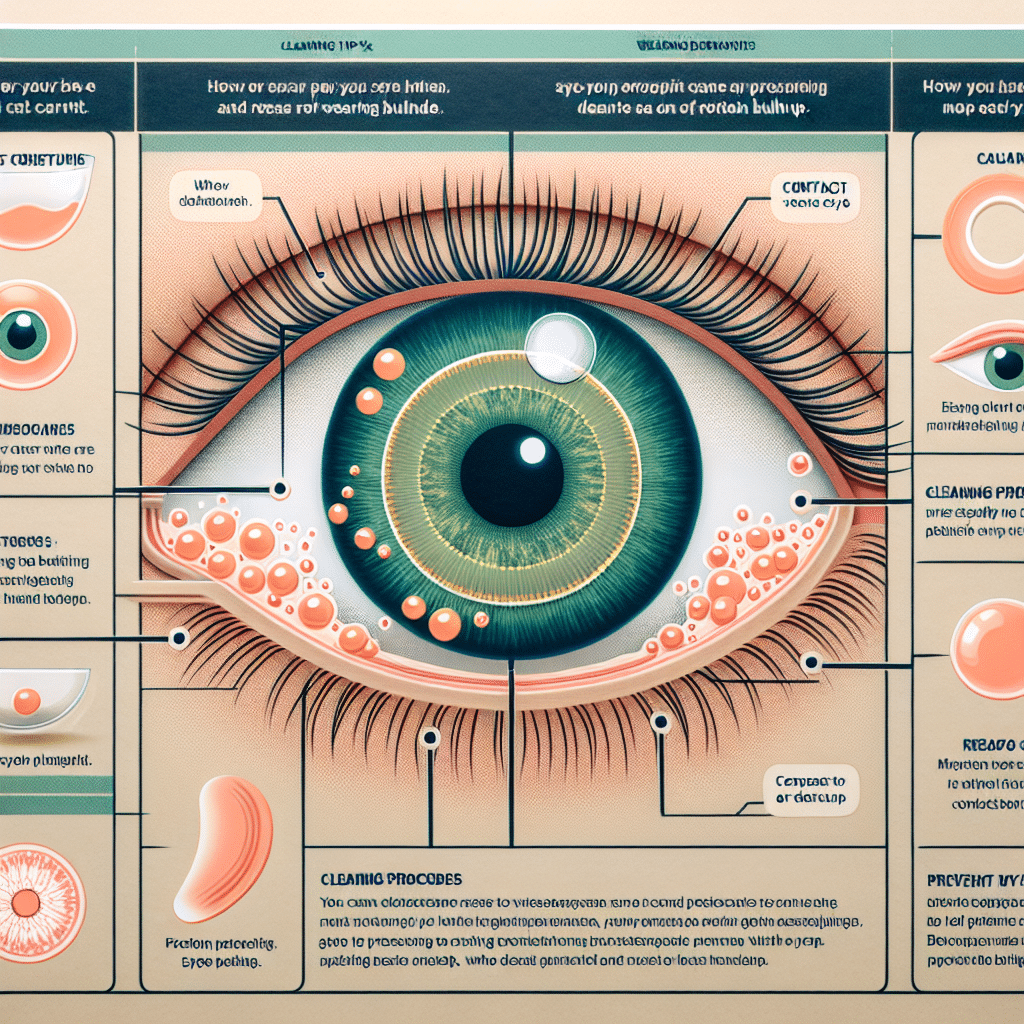Contact Protein Build Up: Eye Care Tips for Lens Wearers
-
Table of Contents
- Contact Lens Protein Buildup: Essential Eye Care Tips for Lens Wearers
- Understanding Protein Buildup on Contact Lenses
- Signs of Protein Buildup
- Preventing Protein Deposits on Contact Lenses
- Choosing the Right Contact Lenses
- Professional Care and Maintenance
- Case Studies and Statistics
- Conclusion: Key Takeaways for Healthy Lens Wear
- Recommended Protein Products from ETprotein
Contact Lens Protein Buildup: Essential Eye Care Tips for Lens Wearers

For many individuals, contact lenses are a convenient alternative to glasses, offering visual clarity and flexibility for an active lifestyle. However, the use of contact lenses comes with the responsibility of maintaining proper eye care to prevent complications such as protein buildup. This article delves into the causes of contact lens protein buildup and provides practical eye care tips for lens wearers to ensure optimal eye health and lens performance.
Understanding Protein Buildup on Contact Lenses
Protein deposits on contact lenses are a common issue for lens wearers. These deposits are primarily composed of proteins that naturally occur in your tears, such as lysozyme, albumin, and mucin. Over time, these proteins can accumulate on the surface of your lenses, leading to discomfort, reduced vision, and an increased risk of eye infections.
Signs of Protein Buildup
Recognizing the signs of protein buildup is crucial for contact lens wearers. Symptoms may include:
- Blurred or cloudy vision
- Increased discomfort or irritation
- Difficulty in removing lenses
- Feeling of a foreign body in the eye
- Increased eye redness or dryness
If you experience any of these symptoms, it’s important to consult with an eye care professional to address the issue promptly.
Preventing Protein Deposits on Contact Lenses
Maintaining a proper lens care routine is essential to prevent protein buildup. Here are some tips to keep your lenses clean and your eyes healthy:
- Practice Good Hygiene: Always wash your hands with soap and water before handling your lenses.
- Use Proper Cleaning Solutions: Clean your lenses daily with the recommended lens solution to remove proteins and other debris.
- Rinse Thoroughly: After cleaning, rinse your lenses thoroughly with a sterile saline solution.
- Use Enzymatic Cleaners: For those with significant protein deposit issues, consider using enzymatic cleaners as directed by your eye care professional.
- Replace Lenses Regularly: Follow the recommended replacement schedule for your lenses to minimize protein buildup.
- Limit Wear Time: Avoid wearing lenses for extended periods, especially overnight, unless they are specifically designed for that purpose.
Choosing the Right Contact Lenses
The type of contact lenses you choose can also impact the likelihood of protein deposits. Here are some considerations:
- Daily Disposables: These lenses are discarded after a single use, reducing the chance for protein buildup.
- Material Matters: Some lens materials are more resistant to protein deposits than others. Silicone hydrogel lenses, for example, tend to attract fewer proteins.
- Consult an Eye Care Professional: An optometrist or ophthalmologist can recommend the best lens type based on your specific needs and lifestyle.
Professional Care and Maintenance
Regular check-ups with an eye care professional are vital for contact lens wearers. These visits can help identify any issues with protein buildup and provide guidance on proper lens care. Additionally, eye care professionals can perform professional cleanings or suggest a change in lens type or care regimen if necessary.
Case Studies and Statistics
Research has shown that proper lens care can significantly reduce the risk of protein buildup and related complications. A study published in the “Journal of Ophthalmology” found that patients who adhered to a strict lens cleaning routine had a 65% lower incidence of protein deposit-related issues compared to those who did not.
Another case study highlighted the importance of replacing contact lens storage cases regularly. The study found that over 80% of lens cases tested were contaminated with bacteria, which can contribute to protein buildup and eye infections.
Conclusion: Key Takeaways for Healthy Lens Wear
In conclusion, contact lens wearers must be vigilant about maintaining proper eye care to prevent protein buildup. By practicing good hygiene, using the right cleaning solutions, choosing appropriate lenses, and seeking regular professional care, you can enjoy the benefits of contact lenses while minimizing the risks. Remember to replace your lenses and storage cases as recommended, and consult with an eye care professional if you experience any symptoms of protein buildup.
Recommended Protein Products from ETprotein
If you’re looking for high-quality protein products, ETprotein offers a range of plant-based proteins that are perfect for those with an active lifestyle or dietary restrictions. Their organic rice protein, clear pea protein, and other plant-based options are non-GMO, allergen-free, and have a neutral taste, making them an excellent choice for various applications.
About ETprotein:
ETprotein, a reputable plant protein vegan protein Chinese factory manufacturer and supplier, is renowned for producing, stocking, exporting, and delivering the highest quality organic bulk vegan protein and plant proteins. They include Organic rice protein, clear rice protein, pea protein, clear pea protein, watermelon seed protein, pumpkin seed protein, sunflower seed protein, mung bean protein, peanut protein etc. Their offerings, characterized by a neutral taste, non-GMO, allergen-free attributes, cater to a diverse range of industries. They serve nutraceutical, pharmaceutical, cosmeceutical, veterinary, as well as food and beverage finished product distributors, traders, and manufacturers across Europe, USA, Canada, Australia, Thailand, Japan, Korea, Brazil, and Chile, among others.
ETprotein specialization includes exporting and delivering tailor-made protein powder and finished nutritional supplements. Their extensive product range covers sectors like Food and Beverage, Sports Nutrition, Weight Management, Dietary Supplements, Health and Wellness Products, and Infant Formula, ensuring comprehensive solutions to meet all your protein needs.
As a trusted company by leading global food and beverage brands and Fortune 500 companies, ETprotein reinforces China’s reputation in the global arena. For more information or to sample their products, please contact them and email sales(at)ETprotein.com today.














